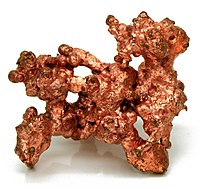
Photo from wikipedia
Copper (Cu) is an extensively used heavy metal and an indispensible micronutrient for living beings. However, Cu is also toxic and exerts multiple adverse health effects when humans are exposed… Click to show full abstract
Copper (Cu) is an extensively used heavy metal and an indispensible micronutrient for living beings. However, Cu is also toxic and exerts multiple adverse health effects when humans are exposed to high levels of this metal. We have examined the effect of single acute oral dose of copper chloride (CuCl2) on parameters of oxidative stress, cellular metabolism, membrane and DNA damage in rat intestine. Adult male Wistar rats were divided into four groups and separately administered a single oral dose of 5, 15, 30 and 40 mg CuCl2/kg body weight. Rats not administered CuCl2 served as the control. Oral administration of CuCl2 led to significant alterations in the activities of metabolic and membrane-bound enzymes; brush border enzymes were inhibited by 45–75% relative to the control set. Inhibition of antioxidant enzymes diminished the metal-reducing and free radical quenching ability of the cells. Oxidative damage caused cellular oxidation of thiols, proteins and lipids. Diphenylamine and comet assays showed that CuCl2 treatment enhanced DNA damage while DNA-protein crosslinking was also increased in the intestinal cells. Examination of stained sections showed that CuCl2 treatment led to marked histological changes in the intestine. All the changes seen were in a CuCl2 dose-dependent manner with more prominent alterations at higher doses of CuCl2. These results clearly show that oral administration of CuCl2 results in oxidative damage to the intestine which can impair its digestive and absorptive functions.
Journal Title: Environmental Science and Pollution Research
Year Published: 2021
Link to full text (if available)
Share on Social Media: Sign Up to like & get
recommendations!